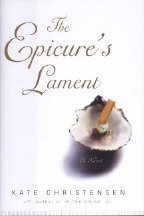The Epicure's Lament
Kate Christensen
Doubleday / Random House
US Hardcover First
ISBN 0-767-91030-3
Publication Date: 03-02-2004
351 Pages; $23.95
Date Reviewed: 03-01-04
Reviewed by: Rick Kleffel © 2004

REFERENCES
COLUMNS
|
|
|
The Epicure's LamentKate ChristensenDoubleday / Random HouseUS Hardcover FirstISBN 0-767-91030-3Publication Date: 03-02-2004351 Pages; $23.95Date Reviewed: 03-01-04Reviewed by: Rick Kleffel © 2004 |
|
|
REFERENCES |
COLUMNS |
Novels for the nail-spitting set just don't come often enough. For sustained froth-mouthed ranting, it's generally pretty slim pickings. Now, annoyance is a dish best served hot, so we like our complaints to be pertinent to what we're pissed off about at this particular moment. And yet we also like our violent anger and self-loathing to have that universal touch, because everybody loves to get furious, and lord knows, there's more than enough stupidity about to justify such outpourings. In a time when nearly illiterate rants are chart-topping musical hits, is it too much to ask for a decent novel full of snarl and sagacity? There's a huge audience of those whose houses are festooned with the dents they've made by punching the walls in fits of irrational anger. By not responding to their call, publishers and writers risk becoming targets of that anger rather than the suppliers of the eloquent censure we all need.
Kate Chistensen goes a long way to correct the ills brought about by a culture of happy-wappiness. 'The Epicure's Lament' showcases the voice of Hugo Whittier, certainly the wittiest grump to be given space to grumble in many a year. Hugo's foul mood provides more than 350 pages of pith, pathos and pissed-off prose poetry that will have readers howling and trying the patience of their significant others as they read passage after passage aloud, relishing the anger, cherishing the bilious emissions of a man who hates life so much he's letting it end, like so many of us, one cigarette at a time.
'The Epicure's Lament' details the last days of Hugo, dying of Buerger's disease, as he stews in the decaying Whittier family mansion in the Hudson Valley of New York. He's been enjoying his solitude for a number of years now. Divorced from his wife, estranged from his family, Hugo is happy to sit and cook, contemplating the work of those he admires, MFK Fisher and Michel de Montaigne. But his happy time of grousing it alone is about to come to a screaming halt. His brother Dennis, kicked out of his house by his wife, is moving in. And Hugo's estranged wife Sonia has decided to seek out his company, bringing in tow Bellatrix, the girl born to her in her marriage to Hugo but certainly not Hugo's child. Hugo's Fag Uncle Tommy is going to move back in. The house will be full of and for Christmas. Hugo is going to cook the holiday dinner.
'The Epicure's Lament' is a novel where stellar humorous prose writing provides a plot more propulsive than any so-called page-turner. It's ever so refreshing to have a novel that compels the reader to read by virtue of the vituperative voice telling the story as opposed to some sort of contrived twisting of a plot's neck until it struggles and dies under the strain. But make no mistake about it. This is much more than a long-winded whinge. Christensen is writing a novel of modern mores and morals, and especially the lack of the latter. And while the jacket may natter on about Nabokov and Montaigne -- with good reason -- Christensen drops an even more alluring and to my mind accurate reference when she mentions the work of Svevo in 'Confessions of Zeno'. For while both works derive a driving narrative power from the voice of a crusty curmudgeon, both manage to shine an unpleasantly clear light into the darker chambers of the human heart. Love, marriage, fidelity and infidelity, the whole cloth of American family life comes to light in Hugo's dark outpourings.
Some readers may object to the relentless nature of Hugo's bile, but they can in no way say that it is ever less than gripping reading. Christensen offers just enough modulation in the voice to keep this from becoming a one-note novel. For while Hugo has his hatreds, phobias and obsessions, he also has a heart that is perfectly portrayed, if not a little on the withered side. Contemplating the withered state of their own hard hearts, readers are likely to wish that they could attain Hugo's level of disinterest and dissatisfaction, and know that they could never achieve his eloquence.
Along the way, Christensen supplies enough vomitous recipes to keep the reader gagging with laughter along with a couple that actually sound rather nice. But food is not the point of this book, despite the title. 'The Epicure's Lament' is not about the taste of food, but rather the taste of life. Christensen's Hugo Whittier might not like humanity in general, the people he knows in specific, or anything about anyone. But Christensen has blessed Hugo with a voice that is graceful and eloquent as well as noxious and bilious. Hugo Whittier may not speak for all of us, but he can certainly speak to all us, all the cranks, curmudgeons, coots and complainers. There's a lot amiss with this world. One of the few things that's right is the voice of Hugo Whittier, telling us what's wrong with everything else.